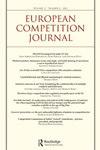Collective labour agreements and EU competition law: five reconfigurations
Q2 Social Sciences
引用次数: 5
Abstract
ABSTRACT The European Commission has recently begun to reflect on whether competition law is a barrier to the formation of collective labour agreements between industry and atypical workers. The policy focus to date has been on whether and how to extend the antitrust labour exemptions to certain classes of atypical worker. This paper shows how efforts in this direction in the Netherlands and Ireland have revealed that this is a tricky path to pursue. As a result, the paper proposes four additional approaches: three of these indicate that even if atypical workers are treated as undertakings and collective bargains between them and employers fall to be assessed under competition law, many agreements will unlikely have anticompetitive effects and for those that may do so, exemptions are possible. A fifth approach is that active antitrust enforcement against employers imposing unfair terms on atypical workers may function to solve some of the concerns that collective bargaining seeks to address.集体劳动协议和欧盟竞争法:五大重构
摘要欧盟委员会最近开始反思竞争法是否是行业与非典型工人之间达成集体劳动协议的障碍。迄今为止,政策重点一直是是否以及如何将反垄断劳工豁免扩大到某些类别的非典型工人。本文展示了荷兰和爱尔兰在这方面的努力如何表明,这是一条棘手的道路。因此,该文件提出了四种额外的方法:其中三种方法表明,即使非典型工人被视为企业,他们与雇主之间的集体交易将根据竞争法进行评估,许多协议也不太可能产生反竞争影响,对于那些可能产生反竞争力影响的协议,豁免也是可能的。第五种方法是,针对雇主对非典型工人施加不公平条款的积极反垄断执法,可能会解决集体谈判试图解决的一些问题。
本文章由计算机程序翻译,如有差异,请以英文原文为准。
求助全文
约1分钟内获得全文
求助全文
来源期刊

European Competition Journal
Social Sciences-Law
CiteScore
1.50
自引率
0.00%
发文量
12
期刊介绍:
The European Competition Journal publishes outstanding scholarly articles relating to European competition law and economics. Its mission is to help foster learning and debate about how European competition law and policy can continue to develop in an economically rational way. Articles published in the Journal are subject to rigorous peer review by leading experts from around Europe. Topics include: -Vertical and Conglomerate Mergers -Enlargement of the Union - the ramifications for Competition Policy -Unilateral and Coordinated Effects in Merger Control -Modernisation of European Competition law -Cartels and Leniency.
 求助内容:
求助内容: 应助结果提醒方式:
应助结果提醒方式:


